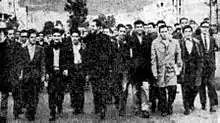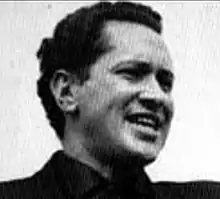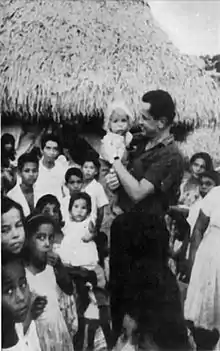Camilo Torres Restrepo
Camilo Torres Restrepo (3 February 1929, in Bogotá, Colombia – 15 February 1966, in Santander) was a Colombian socialist, Roman Catholic priest, a proponent of liberation theology, and a member of the National Liberation Army (ELN) guerrilla organisation. During his life, he tried to reconcile revolutionary Marxism and Catholicism.


As part of the academic staff of the National University of Colombia, he was a co-founder of the Sociology Faculty together with Orlando Fals Borda in 1960. His involvement in several student and political movements during the time won him a large following as well as many detractors, especially from the Colombian government and the church itself. Due to the growing pressure to back down from his radical politics, Camilo Torres was persecuted and went into hiding (leaving his job as an academic) by joining the guerrillas in Colombia. He served as a low-ranking member of the ELN to whom he also provided spiritual assistance and inspiration from a Christian communist point of view. He was killed in his first combat experience, when the ELN ambushed a Colombian Military patrol.[1] After his death, Camilo Torres was made an official martyr of the ELN.
He is perhaps best known for the quote: "If Jesus were alive today, He would be a guerrillero." He was a life-long friend of fellow socialist Luis Villar Borda and Colombian writer Gabriel García Márquez.
In the Dominican Republic in 1970, a revolutionary group that included Catholic clergy members and university students was founded under the name CORECATO, which stood for Comando Revolucionario Camilo Torres (Revolutionary Command Camilo Torres). In New York City, San Romero of the Americas Church-UCC has founded the Camilo Torres Project in 2009. This project works for social justice and peace for the people of the Washington Heights community.

See also
External links
- Science, revolution and belief in Camilo Torres: a secular Colombia? por Alejandro Sánchez Lopera (English version) Revista Nómadas Colombia
- Ciencia, revolución y creencia en la experiencia de Camilo Torres: ¿una Colombia secular? por Alejandro Sánchez Lopera - Revista Nómadas Colombia
- Camilo Torres Restrepo: La posibilidad de una moral insurgente Book Chapter
- (in Spanish)Biography from filosofia.org
- (in Spanish)Biography from Marxists.org
- "Camilo Torres, Primer sacerdote guerrillero"